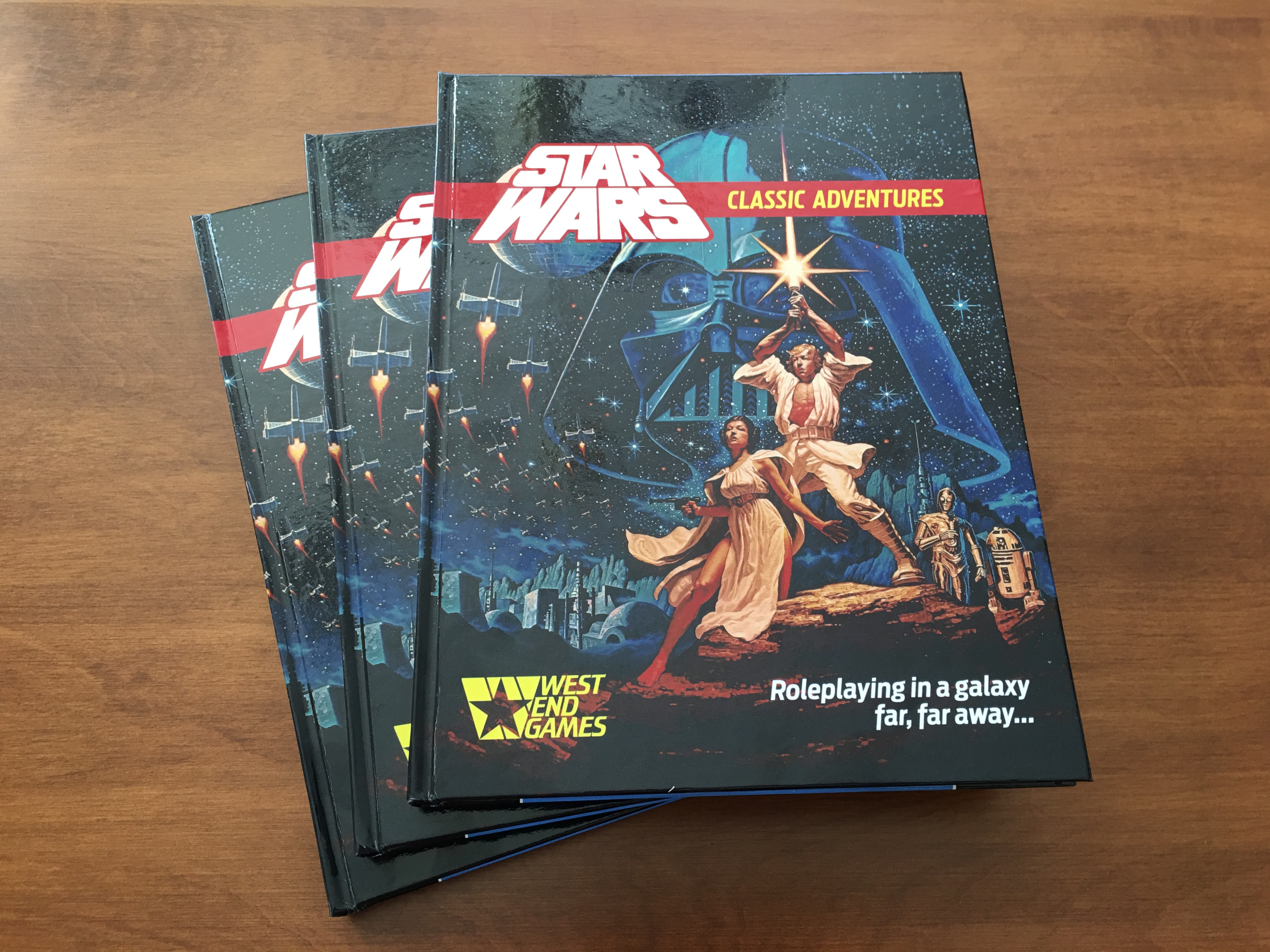
Star Wars WEG d6 1e
Wanted to jot down my thoughts about a potential future shared RPG campaign technique using the Star Wars setting. Helping some folks on the d6 community form an Organized Play group (since I used to manage the D&D regional organized play) so these thoughts are in my mind.
In a nutshell, we’d have episodic games set in the Rebellion era, where we’d rotate GMs and have our characters go on Military missions but return to homebase afterwards. Perhaps we could have GMs own specific story threads or NPCs. Games could be played in a variety of contexts (Saturday Nights, Ragnarok Saturdays, one-shot events, etc.).
For those interested, here are my initial thoughts on how this might work.
General Information
ARTICLE 1: Adventure Premise — Players play characters who are members of the Rebellion during the time period between Episodes IV and V. Characters are not Jedi, but may potentially be Force sensitive. As members of the Rebel Alliance, you are stationed out of a secret headquarters in the Arkanis sector. From your home base you join other members of the Rebel Alliance to go on adventures assigned to you from the Rebel leadership. Adventures are self-contained and take place over a game session of about 3-4 hours. After the adventure is over, you return to home base and await orders for your next mission. Each mission may be with a different set of characters.
We may optionally have seasons, with the first season or two being in the age of Rebellion, and perhaps season 3 being set during the latest trilogy or in the Old Republic.
ARTICLE 2: Dynamic Games — Players may move freely between games run by different gamemasters and may transport their character to any game participating in SWd6OP. Games can be run in person or online via virtual tabletops like Roll20.net.
ARTICLE 3: System Choice — Players must build characters according to West End Games’ “Star Wars: The Roleplaying Game” 1st edition with errata. Gamemasters can choose to use any rules from 2nd Edition, 2nd Ed. R&E, 2nd Ed. REUP, or retroclone so long as they disclosure the specific rules they are using that are different from 1st Edition.
ARTICLE 4: Character Types — Characters can be flawed but fundamentally must be heroic and do good on behalf of the Rebel Alliance. Characters are built according to standard character creation rules.
- Species Restrictions: After reviewing the 1e rules, we may come up with some species restrictions. For example, all species that get a 2D for 1D at the beginning of character creation may only do so once. Meaning they cannot put 2D and get 4D in a single skill. (This is a 2e concern, not sure it applies to 1e).
- Force Sensitives: We may add more specifics on which Force sensitive powers you can acquire. Force sensitive characters cannot use light sabers. (In future seasons, we may allow ALL characters to be Jedi. Rule of thumb is that none of you are Jedi, or you all are, which will vary by campaign). There is a d6 template called the Lrri Tenets. This introduces a martial monk of sorts to Star Wars. Akin to the guy from Rogue One. We might use this template.
ARTICLE 5: Skill Points & Character Advancement — Characters should start each game with 5 Skill Points (aka Character Points). Characters may spend unused Skill Points after games to improve their characters as described in 1e. Players must log their experience and be prepared to show new gamemasters their past history of play and Skill Point rewards.
ARTICLE 6: Character Death — Characters can die. After a character dies, the player must create a new character which can join in that game or in the next game, at the GM’s discretion. New characters start with zero experience.
ARTICLE 7: Multiple Characters — Players can have multiple characters, but each character earns their own Skill Points; they cannot be transferred between characters.
ARTICLE 8: Gear & Expenses — As members of the Rebel Alliance, your gamemaster will assign you an amount of funds to spend on mission-specific needs such as bribes or equipment. The Rebel Alliance will pay for your room and board and reasonable expenses. Any surplus goods such as stolen spaceships or credits acquired from military operations goes back to the Rebel Alliance, not the player’s pockets.
ARTICLE 9: Tracking Advancement — We will use the honor system, but in order to ensure players are tracking their character points correctly, we will track advancement using a form which dumps date into a shared Google Spreadsheet.
Gamemaster Information
ARTICLE 10: Giving Back as a Gamemaster — Part of what makes Star Wars d6 Organized Play fun is giving everyone a chance to play. We’ll make that happen in part by having players step up to run occasional games. Although there is no specific requirement, have as a goal to run 1 game for each 4 games that you play in. This way everyone can play as much as they want, without limiting games by lack of gamemasters who are willing to only run games.
ARTICLE 11: Adventure Guidelines — Gamemasters should use 1) modified classic adventures that make sense in the organized play environment, or 2) original adventures that are created and shared with the organized play gamemaster community. Adventures should be self-contained, run in 3-5 hours, adhere to Star Wars canon, and not introduce situations or outcomes that affect canon or disrupt other gamemaster’s storylines.
- Extended Adventures: Some adventures may take 2-3 sessions of play. In these cases, you should have the heroes return to their home base (ship, camp, etc.) after each session so you can explain the why you have different characters in some of the session (the likelihood of having the exact players and having perfect attendance across three sessions is usually pretty slim!).
- Home Base: ‘Nothing exciting happens’ at the Rebels home base (since all GMs will be sharing it we don’t want it to be volatile).
- Recurring NPCs: NPCs generally don’t cross GM storylines. NPCs are self-contained in an adventure, or if the GM has the NPC as a recurring person, they are only in that GMs storyline. Alternatively, the recurring NPC is ‘off camera’ seen on a holovid recording but you can’t include them or kill them.
ARTICLE 12: Gamemaster Rewards — Gamemasters earn 5 Skill Points for each game they run which they can spend on characters which they play in future games.
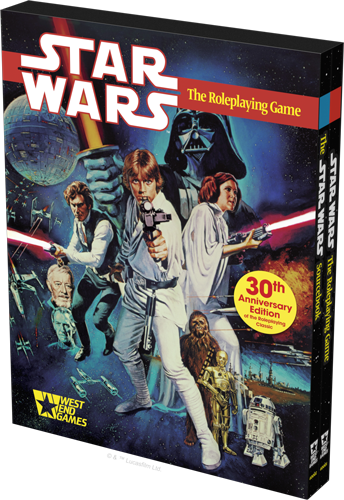 There is probably some selection bias (for those into statistically significant polling techniques) but nonetheless the results are interesting.
There is probably some selection bias (for those into statistically significant polling techniques) but nonetheless the results are interesting.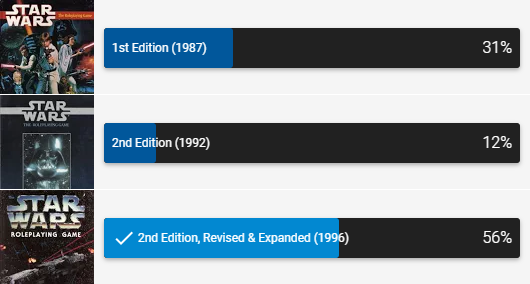
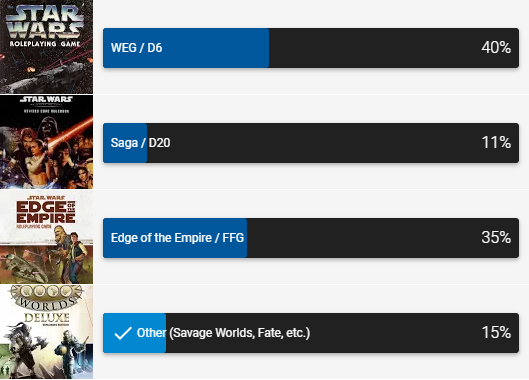
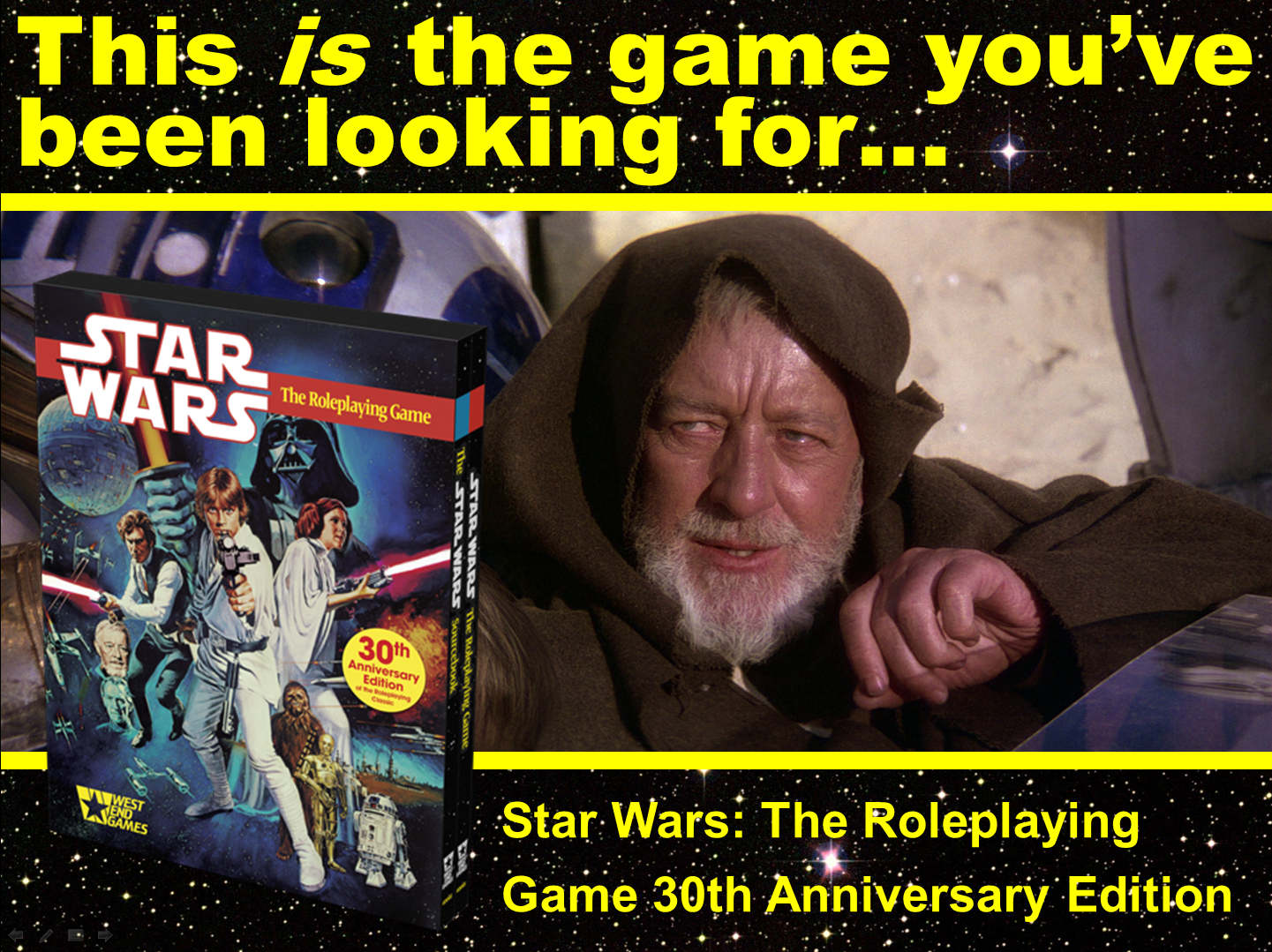


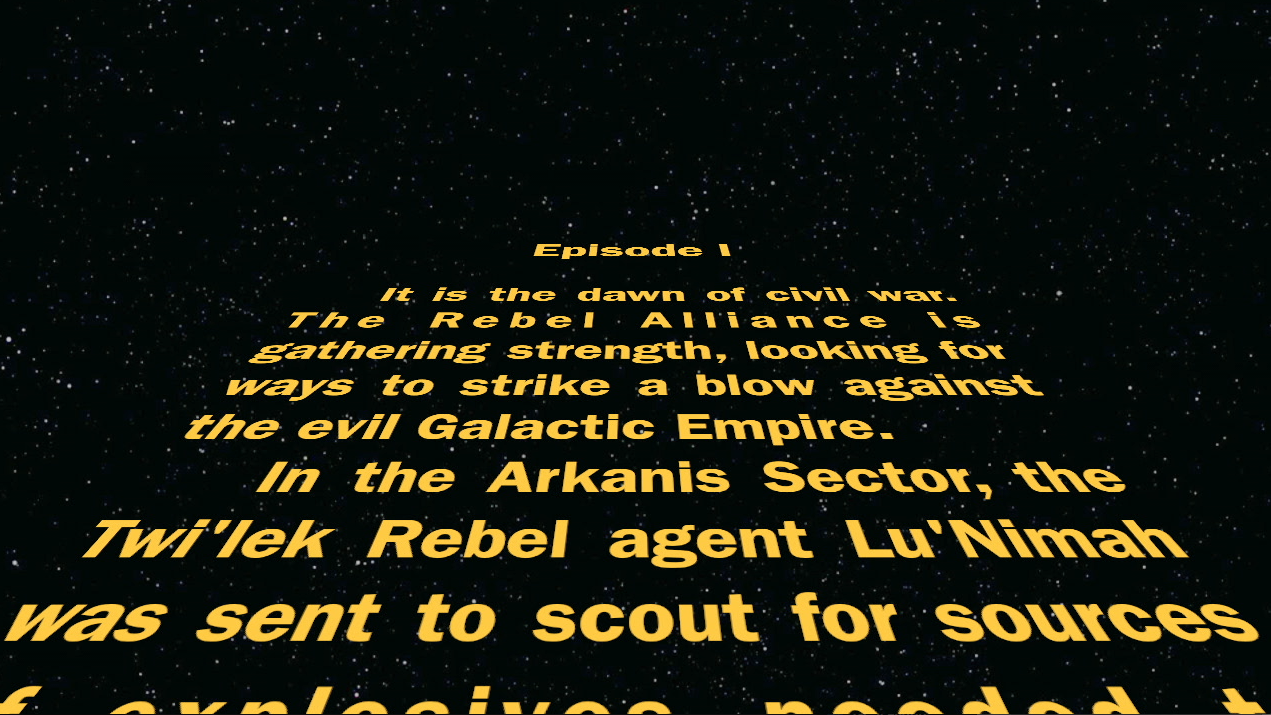
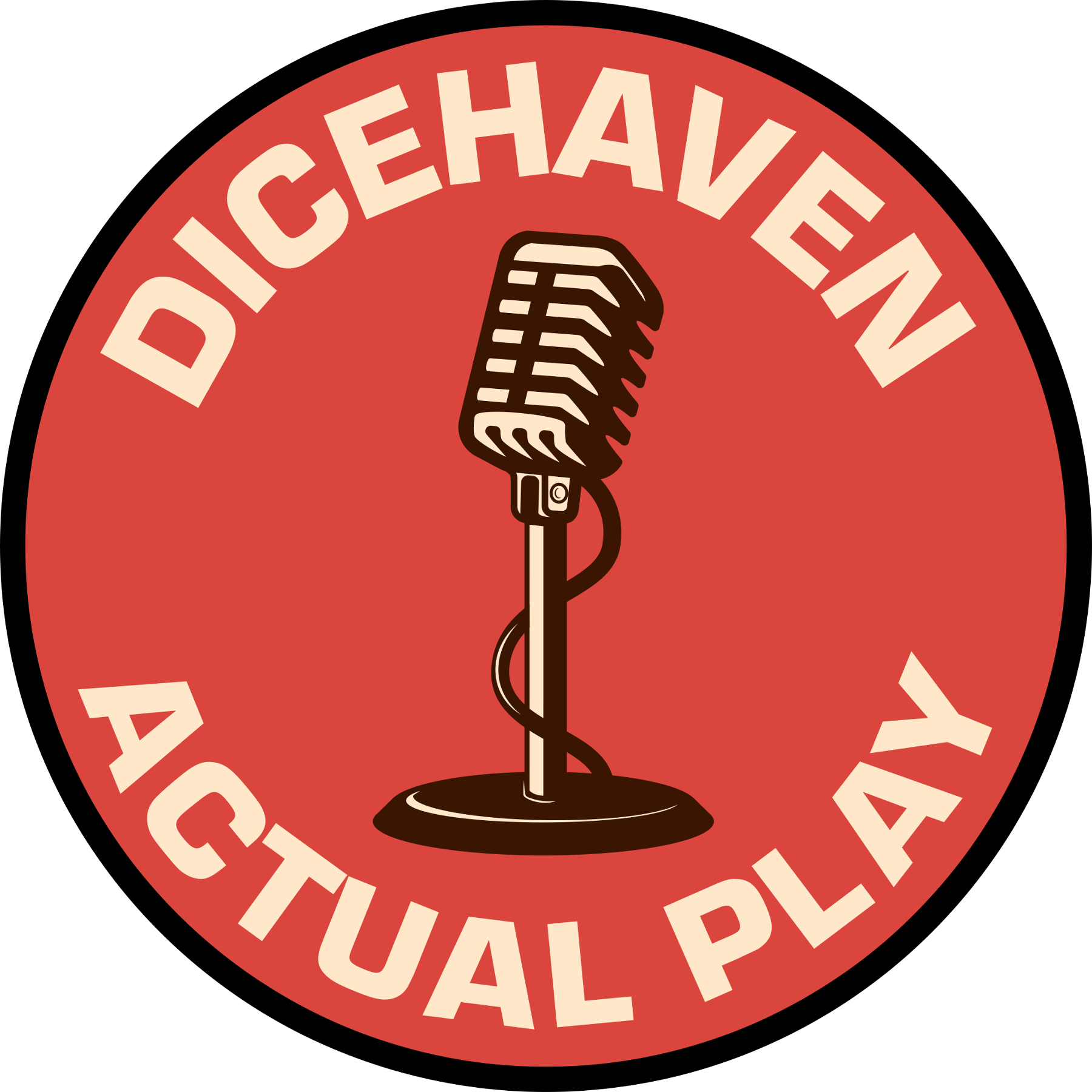
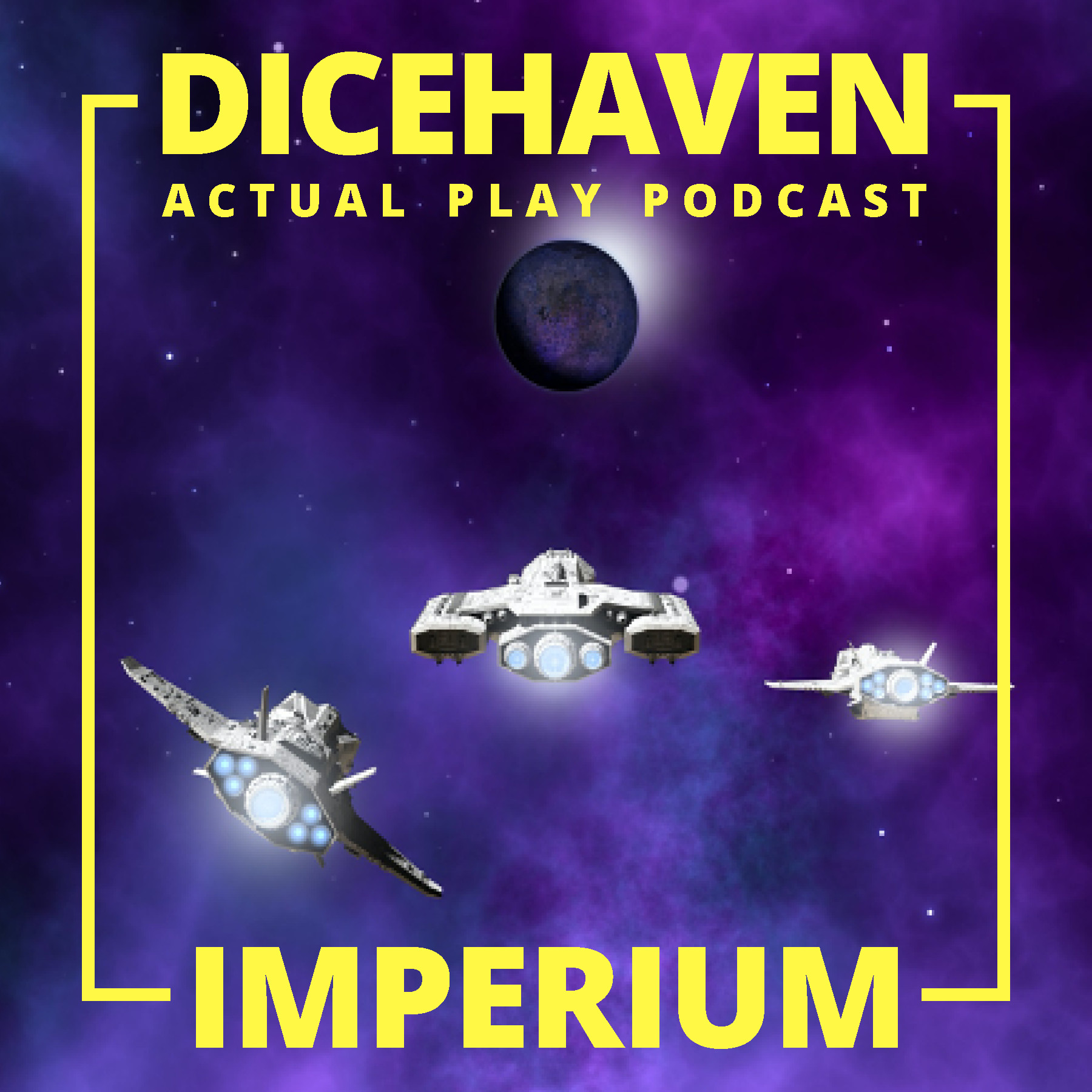
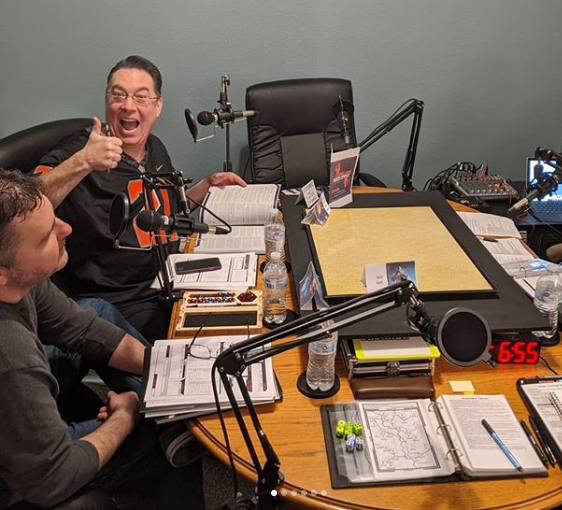
Recent Comments